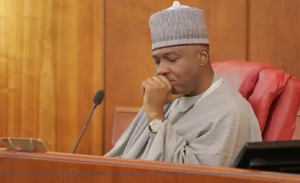By Owei Lakemfa
The Senate stands alone. Cold, desolate and isolated. Open to the elements as showers of criticism rain on it relentlessly from all parts of the country, and even abroad.
The Senate’s pains are self-inflicted; it had consciously invited the torrents on its head when it decided to entertain a frivolous bill, “The Bill for an Act to Prohibit Frivolous Petitions and Other Matters Connected therewith”, otherwise known as the anti-social media bill.
All discerning Nigerians, I know, are conscious of the fact that the bill, like doctors will say, was Brought In Dead, BID, but curiously the Senate believes that it is alive or can be resurrected.
Subsequently, in the attacks against it, the Senate has had no known friends coming to its rescue, or calling for a ceasefire in this one-sided fight between the Senate and the populace led by the middle class. Also, all credible institutions, including the Presidency, have distanced themselves from the Senate on this issue.
The implication is that even if the Senate stubbornly or arrogantly sticks to its guns, it is doubtful if the smarter Honourables in the House of Representatives would want to have anything to do with the bill. But if by any fluke, such a bill were to survive the roasting and passes to the President for assent, the Presidency, has already made its position known: it will not support a bill that seeks to abridge or circumvent freedom of speech.
So simple logic and commonsense dictate that the Senate backs down and spends its time on more productive matters. The opportunities and powers of the internet are phenomenal. It is the future of the world and it is in our best interest to harness, rather than try to arrest it as the Senate seeks.
The challenge of the distinguished Senators should be how to use legislation to make all Nigerians above ten be computer literate, especially when most can operate a cell phone.
How do we expand the internet and make access a right? How do we utilize the millions of functional cell phones in the country for literacy and mass mobilisation? The internet encourages the blossoming of ideas.

It is a theatre of contest and development of knowledge. To seek to punish its usage under any guise, like the Senate is doing, is undisguised backwardness. The Senate should legislate for the construction of mass housing like Alhaji Shehu Shagari and Lateef Jakande did, rather than pass a legislation that will require the expansion or construction of more prisons.
Clearly, the Senate, rather than being concerned about the content of some of the postings in the social media, is angry and irritated. Hence its proposal to jail for two years or fine N2 million or impose both on any person whose post is adjudged to set the public against any person, group or government institution.
Apart from the bill being illogical, it is ridiculous that in a country where sections of government think paying the worker N18,000 minimum wage is too high, such a hefty fine can be imposed on the same worker for an alleged social media infraction. That is over nine years of his current pay.
But the bill contains far more poison than required to kill the social media. It generally aims to kill the whistle blower and re-introduce the infamous Media Decree which was intended to chain the mass media .
Part of this bill says that: “Any person who unlawfully uses, publishes or causes to be published any petition, complaint not supported by a duly sworn affidavit shall be deemed to have committed an offence and upon conviction, shall be liable to imprisonment for six months without an option of fine.” So the issue is not whether the petition is truthful or not.
It also states that any person who makes any allegation or publication without a sworn affidavit with malicious intent to discredit or set the public against any person or group of persons, institutions of government, shall be liable to two year imprisonment or a N4 million ($20,000) fine.
The Senate Anti-Social Media Bill is like a person who rather than take an analgesic for his headache, thinks it is better to cut off his head.
But advising such a person not to sever his head is not to guarantee that he will no longer have headaches. So long as he has his head on his neck, he will have more headaches. But even if the Senate decides that this is the best step to take, the rest of society has the duty to prevent it doing so because suicide is a crime.
All these is not to deny that there can be frivolous petitions and publications, or that the social media can be used for negative ends. Personally, I am concerned about the level of intolerance. But the solution is to build a counter culture and where necessary, use existing laws like that of libel.
There is of course the need for decorum on the social media, but it cannot be achieved by fiat. Rather we have the challenge to develop our traditional etiquette and make it dominate. The struggle starts from the home, school and our streets, not from a draconian legislation that will tear down our fundamental freedom of expression, diminish debates in our polity and water down governance.
Even as we debate, there is an unflattering photograph splas-hed on the social media of the distinguished author of this bill, Senator Bala Ibn Na’allah. In it, he is dressed in ill-fitting clothes good only for an unimaginative clown. I do not think it is good to portray a distinguished author in such light. Under the bill, those circulating such an offensive photograph would have needed only to plea mitigation of their sentence.
But I appeal to our highly revered Senate to overlook such a misdemeanor. It should realise that if the bill were to become law, many of those who would use the social media negatively would create fake accounts. It will then be like attempting to catch the wind in your grasp.
May the soul of the departing bill rest in peace.












